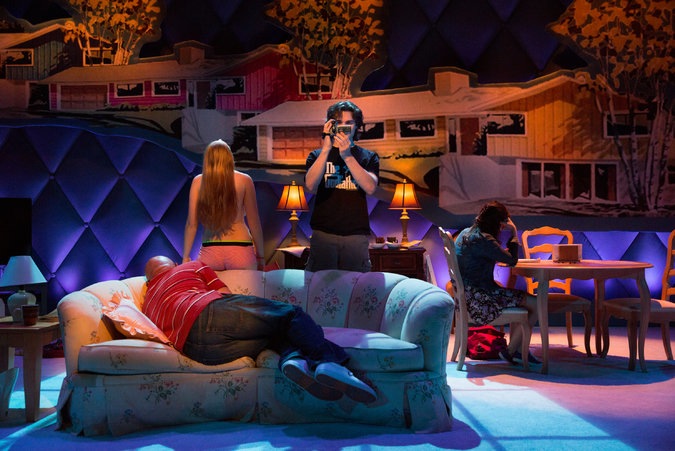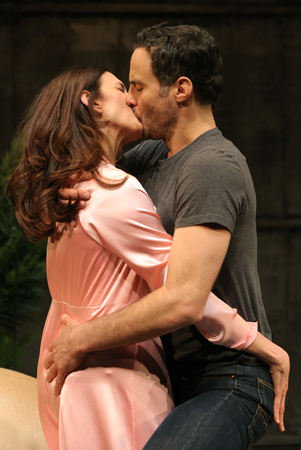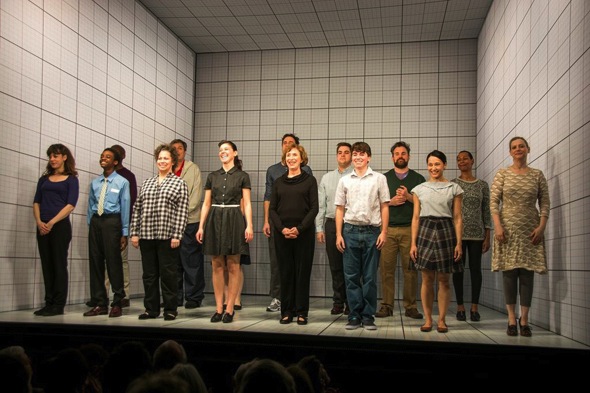New York Theater Round Up: “Intimacy,” “Stage Kiss,” and “Love and Information”
A trio of superb off Broadway plays explore the complicated faces of love and lust — from the seamy to the sublime.
Intimacy by Thomas Bradshaw. At the Acorn Theater at Theater Row through March 8.
Stage Kiss by Sarah Ruhl. At Playwrights Horizon through March 23.
Love and Information by Caryl Churchill. At the Minetta Lane Theatre, booking through April 6.

A scene from the shocking but pointed “Intimacy.” Austin Cauldwell, with video camera, is aided in his project by Ella Dershowitz and Keith Randolph Smith.
by Tim Jackson
Three wildly divergent plays currently off Broadway in New York turn their sights on themes of love and sex. Intimacy, Stage Kiss, and Love and Information each approach the metaphysics and chemistry of love with humor and pathos, but with entirely different perspectives on the confusion and difficulties of contemporary romance.
Intimacy
The most provocative of the three stagings is the New Group’s production of Thomas Bradshaw’s Intimacy, directed by Scott Elliott at the Acorn Theater. It may be the most scandalous evening of theater I’ve seen in some time: this is a promising new playwright who pricks us with such glee that it is impossible not to laugh while you gasp at the script’s audacity. It’s been a while since The New England Watch and Ward Society or “banned in Boston” held sway here, but I am pretty sure this show will never play Beantown.
Set in the suburbs, the story follows three families: James is a devout widower with a dark secret whose horny teenaged son, Matt, is learning about the art of frottage (look it up) from Sarah, the bright daughter of Fred, a neighbor and contractor whose sexuality is conflicted. Next door lives a mixed race couple, Jerry and his older wife Pat and their young, beautiful, and zaftig daughter Janet, who they discover has a side job as a rising porn star.
To put it mildly, the stage is set for some bawdy antics. In the course of a very coarse evening the audience will be offered (or subjected to, depending on your level of discomfort) discussions and/or demonstrations of just about every sex act commonly practiced between men and women, including imaginative combinations thereof. The play is structured like a cheesy pornographic movie. Everybody is obsessed with sex, wants to try everything, and to do it with everybody else. When Matt decides to use a gift of $40,000 from his father to make a frottage porno film starring Janet, things gets sticky. To even describe the goings-on, the body parts on full display, the uses of video, and the x-rated discussions, would be test the limits of good taste. The question is – why sit through all this. Does it have a point beyond titillation?
Pornography is a 100 billion dollar international business. Whether it is prime-time twerking, late night male enhancement products, Scandal, True Blood, or Talk Sex starring the grandmotherly Sue Johanson, we are nation both addicted and repressed. While the play may be shocking, the sex is not sexy and the dialogue is surprisingly humorous, fearlessly unrelenting to the point of the farcical. There is a saying: “Everybody does it, and nobody talks about it.” Well, they do here. And while the play is not for everyone, Bradshaw quite logically demands that form match subject. Beyond the ultra- frank conversations, he raises difficult questions of female empowerment, sexual and racial identity, and even elder and teenage sexuality. The Internet has raised the stakes for the libido. Beyond the laughs and gasps, Intimacy demands that there be a cultural conversation about the impact that pornography has and will continue to have on relationships, families, and society.
Stage Kiss
Stage Kiss, Sara Ruhl’s new play at Playwright’s Horizon, takes an entirely different tack on similar themes. An actress, referred to only as “She,” arrives at an audition. She hasn’t worked in a while, but exudes the pizzazz of a seasoned pro, though she’s a little discombobulated. Marvelously played by Jessica Hecht with a halting, wounded confidence, ‘She’ ends up cast opposite an ex-lover (‘He’ played by Dominic Fumusa) an actor with whom she once had a passionate and volatile relationship. Instead of the illusion of sexuality as intimacy, which is explored in Thomas Bradshaw’s play, here the delusion of romantic expectation is dissected. The two are required to kiss night after night in a revival of a tawdry ’30’s musical comedy of manners, and the relationship gets out of hand. She is married and well-off, while he is neither. Acting, it is often said, is the art of being real in imaginary circumstances. The physical act of kissing is very real, emotional, and intimate. Actors often fall in live with other actors in the course of a production, so the idea of rekindled love is entirely plausible.
But as she does so well in plays such as Dead Man’s Cell Phone and In The Next Room, or The Vibrator Play, Ruhl expands on her initial premise, moving into a comic as well as poetic take on artifice and actuality. As She, Hecht has a disconcerting way of glancing at the audience as though she is watching us, knowing we are watching her. Meanwhile, she rehearses the play-within-in-the-play, continually breaking the spell to ask for feedback from the director (a perfectly fey and efficient Patrick Kerr). She immerses herself in the dreadful writing and music of the tacky melodrama as she slips back into a reverie of romance with her co-star and former lover. This is much to the dismay of her husband, and grown daughter who we meet in the second act and who are doubled by actors from the first act.
At times what should be ‘reality’ begins to resemble a bad ’30s play. Later on, when She and He are cast in another dreadful play, this one written by the director, romance, role-playing, language, and music become hopelessly intertwined. Ruhl plays with layers of farce and artifice, reality and performance with an obvious affection for the craziness of the craft and the people who practice and love theater. Take this exchange for example, which is particularly ironic in light of the play Intimacy. Here the characters are trying to deal with the fact they are forced to kiss on stage dozens of time a week.
She:
Why do you think people enjoy watching other people kiss on stage anyway?
He:
They don’t enjoy it. They tolerate it.
She:
What do you mean?
He:
They tolerate it because it signifies resolution, which people like to see on stage but they don’t really like to see the act of kissing onstage only the idea of kissing onstage. That’s why actors have to be good-looking because it’s about an idea, an idea of beauty completing itself. You don’t like to see people do more than kiss on stage/ It’s repulsive.
She:
But why do we want to see people have sex in the movies?
He:
That’s because you can be alone in your own mind when you watch a movie and it’s like masturbation but you can’t be alone when you watch a play because there’s always someone next to you. That’s why it’s uncomfortable to watch people have sex on stage but pleasant to watch them have sex in movies. That’s why porn stars don’t have to be as good-looking as actors because we’re not watching the idea of sex, but sex itself, which can be ugly. That’s why the theater is superior to film because it’s less like masturbation.
Love and Information
The most remarkable of the three productions is Love and Information by Caryl Churchill (Top Girls, Mad Forest, Cloud Nine) at the Minetta Lane Theater. A large cast of men and women of varying ages and races perform 57 short scenes in just over two hours. Several are only one line long, while others serve up brusque, compelling scenarios. Each provides a piece of a the play’s intriguing rumination on the nature of love, science, language, relationships, the natural world, and, well, the universe.
The production is directed by the playwright’s frequent collaborator, James Macdonald, on a set designed by Miriam Buether. It is a square cube wallpapered on all sides, top and bottom, by enlarged graph paper. Each group or couple appears in rapid succession as if they are being measured and analyzed in some experiment in a laboratory run by the gods. As each scene ends, the stage goes absolutely black and sounds come up that provide an aural transition which covers up the mechanics of the set change. Try as you can, you cannot see into that blackened cube. Suddenly another scene flashes into place – a fresh set of characters, props, and set pieces, appear as if by magic. It is a stunning effect.
Thankfully, this is more than a gimmick of staging and the writing goes beyond satiric comments on our fractured attention spans in the Internet age. The challenge of trying to piece together the logic of the five “chapters” in which the scenes present themselves, or to imagine the backstory and context of such an enormous range of sharply written bits of conversation, is dizzying and powerful. A man asks another, “How do you know I’m evil?” A male and female clown in dazzling outfits discuss fortune telling, finally revealing they are in an adulterous relationship. A man with no short-term memory is led to a piano (“I can’t play this”) as he proceeds to read a score while accompanying an opera singer. Two gay men discuss the color red. A boy with congenital analgesia (in which a person cannot feel physical pain) asks his sitter (?) to explain what “pain” is like. Following a night out, a wealthy couple in formal wear discuss and argue over math. Two Elvis impersonators have a quick exchange on the Palestine -Israeli conflict. There is even a scene where a man talks about being in love with his computer program. (The play was produced in London before the release of the film, Her)
The tiny ruminations and conversations — varying from the casual to the calamitous — consider memory, the past, the future, biology, language, the stars, fate, God, and more. Intellect and imagination struggle to see an overarching theme or to envision a plausible story behind each scene. The overall effect is a mirror of the chaos of contemporary life, which is more than ever a collection of stories, experiences, facts, fancies, and emotional responses from which we try to draw sense and meaning. It is an existential and deeply human look at how we think, how we process information, and how we come to understand the world and ourselves. Ultimately, the play dramatizes the limits of language and science when it comes to understanding the human heart.
Tim Jackson is an assistant professor at the New England Institute of Art in the Digital Film and Video Department. His music career in Boston began in the 1970s and includes some 20 groups, many recordings, national and international tours, and contributions to film soundtracks. He studied theater and English as an undergraduate and has also has worked helter skelter as an actor and member of SAG and AFTRA since the 1980s. He has directed two documentaries: Chaos and Order: Making American Theater about the American Repertory Theater, and Radical Jesters, which profiles the practices of 11 interventionist artists and agit-prop performance groups. His a third documentary, When Things Go Wrong, about the Boston singer/songwriter Robin Lane, with whom he has worked for 30 year, screens with a Q&A and live performances at the Regent Theater in Arlington on April 4th. You can read more of his work on his blog.
Tagged: Caryl Churchill, Intimacy, Love and Information, Sarah-Ruhl, Stage Kiss


